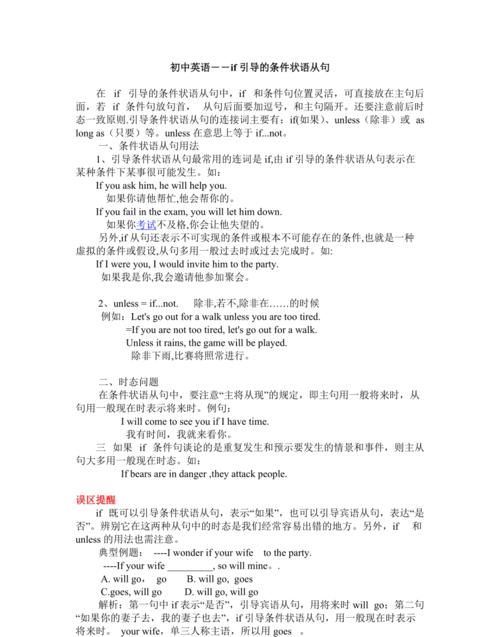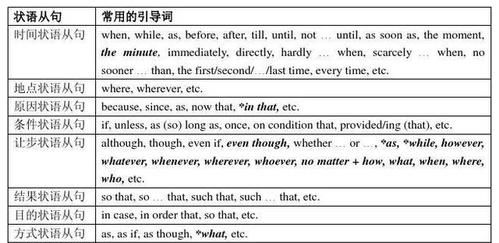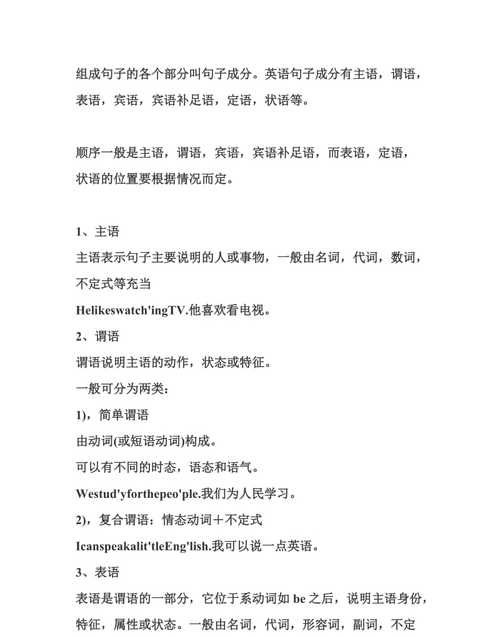本文目录
英语中省略的语法归纳
英语中的状语是用来修饰动词、形容词或副词等词的,那么你掌握了状语的语法知识吗?下面由我为大家整理的状语的语法知识,希望大家喜欢!
状语的语法知识归纳
状语(adverbial)是句子的重要修饰成分。状语是谓语里的另一个附加成分,它附加在谓语中心语的后面,从情况、时间、处所、方式、条件、对象、肯定、否定、范围和程度等方面对谓语中心进行修饰或限制。
一、副词作状语
Don't drive so fast.
别开得这么快。
二、介词短语作地点状语
We live in Hangzhou.
我们住在杭州。
三、名词作状语
The meeting lasted an hour.
会议开了一个小时。
状语从句的种类
1. 时间状语从句
常用引导词:when, as, while, as soon as, before, after, since , till, until
特殊引导词:the minute, the moment, the second, every time, the day,the instant, immediately , directly, no sooner „ than, hardly „when, scarcely „ when
I didn’t realize how special my mother was until I became an adult.
While John was watching TV, his wife was cooking.
The children ran away from the orchard(果园), the moment they saw the guard.
2. 地点状语从句
常用引导词:where
特殊引导词:wherever, anywhere, everywhere
Generally, air will be heavily polluted where there are factories.
Wherever you go, you should work hard.
地点状语从句一般由连接副词where, wherever等引导,已经形成了固定的句型,例如:
句型1:Where+地点从句,(there)+主句。
3. 原因状语从句
常用引导词:because, since, as, for
特殊引导词:seeing that, now that, in that, considering that, given that.
My friends dislike me because I’m handsome and successful.
Now that everybody has come, let’s begin our conference.
The higher income tax is harmful in that it may discourage people from trying to earn more.
4. 目的状语从句
常用引导词:so that, in order that
特殊引导词:lest, in case, for fear that,in the hope that, for the purpose that, to the end that
The boss asked the secretary to hurry up with the letters so that he could sign them. The teacher raised his voice on purpose that the students in the back could hear more clearly.
5. 结果状语从句
常用引导词:so „ that, such „ that,
特殊引导词:such that, to the degree that, to the extent that, to such a degree that,
He got up so early that he caught the first bus.
It’s such a good chance that we must not miss it.
To such a degree was he excited that he couldn’t sleep last night.
6. 条件状语从句
常用引导词:if, unless,
特殊引导词:as/so long as, only if, providing/provided that, supposing that, in case that, on condition that
We’ll start our project if the president agrees.
You will certainly succeed so long as you keep on trying.
Provided that there is no opposition, we shall hold the meeting here.
7. 让步状语从句
常用引导词:though, although, even if, even though
特殊引导词: as(用在让步状语从句中必须要倒装),while ( 一般用在句首 ),no matter „, in spite of the fact that, while, whatever, whoever, wherever, whenever, however, whichever
Much as I respect him, I can’t agree to his proposal.
尽管我很尊敬他, 我却不同意他的建议。
The old man always enjoys swimming even though the weather is rough.
No matter how hard he tried, she could not change her mind.
He won’t listen whatever you may say.
8. 比较状语从句
常用引导词:as(同级比较), than(不同程度的比较)
特殊引导词:the more „ the more „ ; just as „, so„; A is to B what /as X is to Y; no „ more than; not A so much as B
She is as bad-tempered as her mother.
The house is three times as big as ours.
The more you exercise, the healthier you will be.
Food is to men what oil is to machine. 食物之于人,犹如油之于机器。
9. 方式状语从句
常用引导词:as, as if, how
特殊引导词:the way
When in Rome, do as the Roman do.
She behaved as if she were the boss.
Sometimes we teach our children the way our parents have taught us.
状语的排列顺序
在句首时,依次为:时间状语-地点状语-频度副词作状语
在句末时,依次为:方式状语-频度副词作状语-地点状语-时间状语

带状语从句英语格言佳句及翻译
1.帮我写50个含状语从句的句子
时间状语从句1When you think you know nothing, then you begin to know something.当你以为自己一无所知的时候,你就是在开始知道一些事物了。
2When truth is buried under the ground ,it grows, it chokes, it gathers such an explosive force that on the day it bursts out , it blows up everything with it.当真理被埋在地下的时候,它在生长,它感到压抑,它蓄存着这么一种爆炸性力量,一旦冒出,它就会炸破一切!3Strike while the iron is hot. 趁热打铁。4You can feel the air moving as your hand pushes through it.当你的手在空气中挥动的时候,你就能感觉到空气在流动。
5Our headmaster laughed as she spoke.(我们的校长边谈边笑。) 6When she came in, I stopped eating.她进来时,我停止吃饭。
7When I lived in the countryside, I used to carry some water for him.当我住在农村时,我常常为他担水。8We were about to leave when he came in.我们就要离开,就在那时他进来了。
9.We always sing as we walk.我们总是边走边唱。10.As we were going out, it began to snow.当我们出门时,开始下雪了。
11It will be four days before they come back. 他们要过四天才能回来。12Einstein almost knocked me down before he saw me.爱因斯坦几乎把我撞倒才看到我。
13My father had left for Canada just before the letter arrived.我父亲恰好在信到之前去加拿大了。14They had not been married four months before they were divorced. 他们结婚还不到四个月就离婚了。
15After you think it over, please let me know what you decide.你仔细考虑过以后,告诉我你是怎样决定的。16After we had finished the work, we went home.完成工作之后,我们回家了。
17I didn't go to bed until(till) my father came back.直到我父亲回来我才上床睡觉。18I worked until he came back.我工作到他回来为止。
19I didn't work until he came back.他回来我这才开始工作。20Please wait until I arrived.在我到达之前请等我。
21I will go there directly I have finished my breakfast. 吃完早饭,我立即到那里去。22The moment I heard the news, I hastened to the spot.我一听到消息,马上赶到了出事地点。
23As soon as I reach Canada, I will ring you up. 我一到加拿大,就给你来电话。24.By the time you came back, I had finished this book.到你回来时,我已经写完这本书了。
25Each time he came to Harbin, he would call on me. 他每次来哈尔滨,总是来看我。地点状语从句1.We must camp where we can get water.我们必须在能找到水的地方露营。
2you can go where you want to go . 你可以去你想去的地方。3With a car a preson can go where he pleases and when he pleases.有了汽车,人可以想去哪儿就去哪儿,想什么时候去就什么时候去。
4And where there is shale there is likely to be oli.哪儿有页岩,哪儿就可能有石油。5Where there''s a will, there''s an Inheritance(遗产) Tax.哪里有遗嘱,哪里就有遗产税。
6.We'll go where working conditions are difficult. 我们要去工作条件艰苦的地方。Sit wherever you like. 你爱坐哪儿都可以。
7Keep it where you can see it. 把它放在你看得见的地方。8He lives where the climate is mild. 他住在一个气候温暖的地方。
9I'll take you anywhere you like. 你想到哪儿我就带你到哪儿。10You can't camp where / wherever / anywhere you like these days. 如今你可不能随意在哪儿宿营。
补充:11Wherever I am l will be thinking of you. 我不论在哪儿,都会想你的。12Everywhere I go, I find the same thing. 不管我走到哪里,我都发现同样情况。
13Wherever he goes, there's always a spy hanging about. 不管他到哪里,总有一个密探跟着。14Wherever he is he'll be thinking of you. 不管他在哪里,他总会想着你。
15We'll go wherever you say. 你说到哪里我们就到哪里。16Everywhere Jenny goes she's mistaken for Princess Diana. 无论詹妮走到什么地方,她都会被误认为是戴安娜公主。
17The church was built where there had once been a Roman temple. 教堂建在曾一度是罗马神庙的地方。18Next time I hope you'll go where I tell you to. 下次我希望你去我告诉你去的地方。
19No matter where you now are in writing, you can improve with practice. 不管你在写作上你处于什么水平,练习都能帮你提高。20Keep your mobile phone with you no matter where you are. 不管在哪里你都要带着手机。
21With a special train ticket you can travel wherever / anywhere / everywhere you like in Europe for just over£100. 你如持有专车票,仅花一百多一点英镑,就可以到欧洲各地旅行。22Where possible, they tried to acquire colonies. 只要可能,他们就设法取得殖民地。
23Avoid structures of this kind wherever possible. 只要可能,就要避免这种结构。24Where most people saw nothing but a hardened criminal, I saw a lonely and desperate man. 许多人只看见一个冷酷无情的罪犯,但我看到的却是一个孤独而绝望的男人。
25Where there is great love, there are always miracles。.。
2.造几个状语从句的英语句子,中文带翻译
为您解答
She was taking a walk when I called her.
我叫她时,她正在散步。
If I had enough money,I would buy the car.如果我有足够的钱,我就买汽车了。
Because he was ill,he was absent yesterday.
因为他病了,他昨天没有来。
Tom went to school earlier than Kate did.汤姆上学比凯特早。
Please do as I do.请照我做的那样去做。
He studied hard so that he might succeed.他努力学习,以便成功。
3.翻译六句英语句子
1.No matter how hard I worked, it seemed that I couldn't sovlve this maths problem.2.Although we have not seen each other many years, but he has not changed as if. 3.Successeful lecture calls for such as postures, hand signal, and timing control etc.non- language exchange. 4.Before attending the party, please make sure the gift must suit for the master's family. 5.We did not know how can distract the pain his son's dying which brings to her。
4.包含状语从句和定语从句的英语句子
状语从句和定语从句的句子
1. When I am on the way to school every day, I always meet the girl who has long hair.
2. You can ask for help form the teacher who teaches math, if you can't work out the problem.
3. When he stayed up watching, he was late for school the next morning, which made his teacher very angry.
4. The girl who is a little shy was praised by her teacher because she helped an old man get home yesterday.
5. Those who work harder than others will get a better future when they grow up.
6. After I graduate from middle school, I will go to the college where my father studied 25 years ago.
7. We will never forget the days when we spent together in the countryside no matter where we go.
8. However difficult the problem is, he can work it out without any help that his teacher gives.
9. As you can see, we have tried our best to improve our environment that has polluted by us.
10. Before you come here, you had better make a phone to the worker who has worker here for 10 years.
5.英语 方式状语从句 仿造例句 写句子,, 急,
1. He talks as if he knew everything.He talked as if he had known everything.2. He treats me as if I was a child.He treated me as if I had been a child.3. He looks at me as if we never met before.He looked at me as if we had never met before.4. He turns round as if he did not see me.He turned round as if he had not seen me.1. It looks as if he is older than you.2. It sounds as if someone is knocking at the door.3. We fell as if there was omething worng with the plan.4. It tastes as if the soup is a little salty.5. It smells as if mother cooks dinner.1. He standed up as if to leave.2. He waved his hand as if to say goodbye to us.1. He looked out of the window as waiting for someone.2. He sitted there as if thinking.每组都只给了一个答案。
如果你是自己不想做作业,那就这样了。如果你只是想知道自己做得对不对,那给我消息,我把剩下的发给你。

含有状语的句子英语
例子有:
1、She usually gets up at seven in the morning.她一般在早上七点起床。
2、The boy was praised for his bravery.这个男孩因为他的勇敢而被夸奖。

3、When she was 12 years old, she began to live in Dalian.她12岁的那一年开始居住于大连。
4、If I am not busy tomorrow, I will play football with you.如果我明天不忙,我就会陪你踢足球。
5、He speaks English very well. 他英语说得非常好。
英语状语例句20个
1.时间状语从句
when ,while, as ,before, after, since, till/until, once, every/each time, whenever, [as soon as, the moment/the minute , hardly…when no sooner…than]
1)when , while , as
都可表当……时,但有区别。
while 引起从句,表一段时间,而不是一点。有时还有对比的含义。
While she was reading the newspaper, Grandma fell asleep.
While I was reading , she was playing.
When 可表从句动作先于或后于主句中的谓语动词而发生。
When you have finished your report, you should type it out.
另:when 可表“那时、突然”之意。
I was cooking in the kitchen, when I heard a terrible sound.
as 强调动作的同时性,一边,一边
As I was washing dishes, I sang songs.
as 还可表“随着时间推移”
You will get wiser as you grow wiser.
2) as soon as, the moment/the minute , hardly…when no sooner…than
都可指“一……就” ,hardly…when 和no sooner…than 使用时通常用过去完成时,且常用倒装。
He fell asleep the moment he went to bed.
Hardly had he gone to bed when he fell asleep.
注意:
在时间状语从句中,不能出现将来时的形式。
2.原因状语从句
as , since, because, now that 等引导。
because 表直接的原因或理由,常译为因为。
since 一般表对方已知的,无须加以说明的既成事实的理由,常译为“既然”。
as 和because 语意相近,但语气较后者弱。
另外还有一个起并列连词作用的for , 只能放于后半部,表示一种推理或解释,或用作附加说明。
The day must break , for the birds are singing.
3.地点状语从句
where, wherever ;注意不要和where所引起的定语从句弄混。
We shall go where working conditions are difficult.(地点状语从句)
We shall go to the place where working conditions are difficult.(定从,有先行词)
4.条件状语从句
if , unless, so(as ) long as, so far as , in case
注意从句中不能出现将来时的形式。
5.让步状语从句
although(though), even if (though), however, whatever
注意: though (although)引起从句时,主句中不能出现but 。
as 引起从句时,要采用倒装。
Clever as he is, he doesn't study well.
6.结果状语从句
so, so (…)that , such…that 引导,放在主句之后。
7.目的状语从句
so that , in order that 引导,放于主句之后。
注意:so (…)that 和 so that 的不同。
so that 引导目的状语从句时,从句中常会出现can , may, should 等情态动词,而so…that 则没有。
I'll show it to you again so that you can see it clearly.我再演示一次以便你能看清楚些。
He showed it me again so that I saw it clearly.他又演示一次,结果我看清了。
8.方式状语从句
as, as if , as though 等引导。
as if 或as though 引导的从句,既可用陈述语气,也可用虚拟语气,表与主观上的不符。
He looks as if he is ill. (说话方认为他有病。)
He looks as if he were (was) ill.(说话方并不相信他有病)
9.比较状语从句
as…as, than , not so …as…
注意:比较状语从句部分常用省略结构。
I know you better than he does.

以上就是关于状语的句子英语 ,英语中省略的语法归纳的全部内容,以及状语的句子英语 的相关内容,希望能够帮到您。
